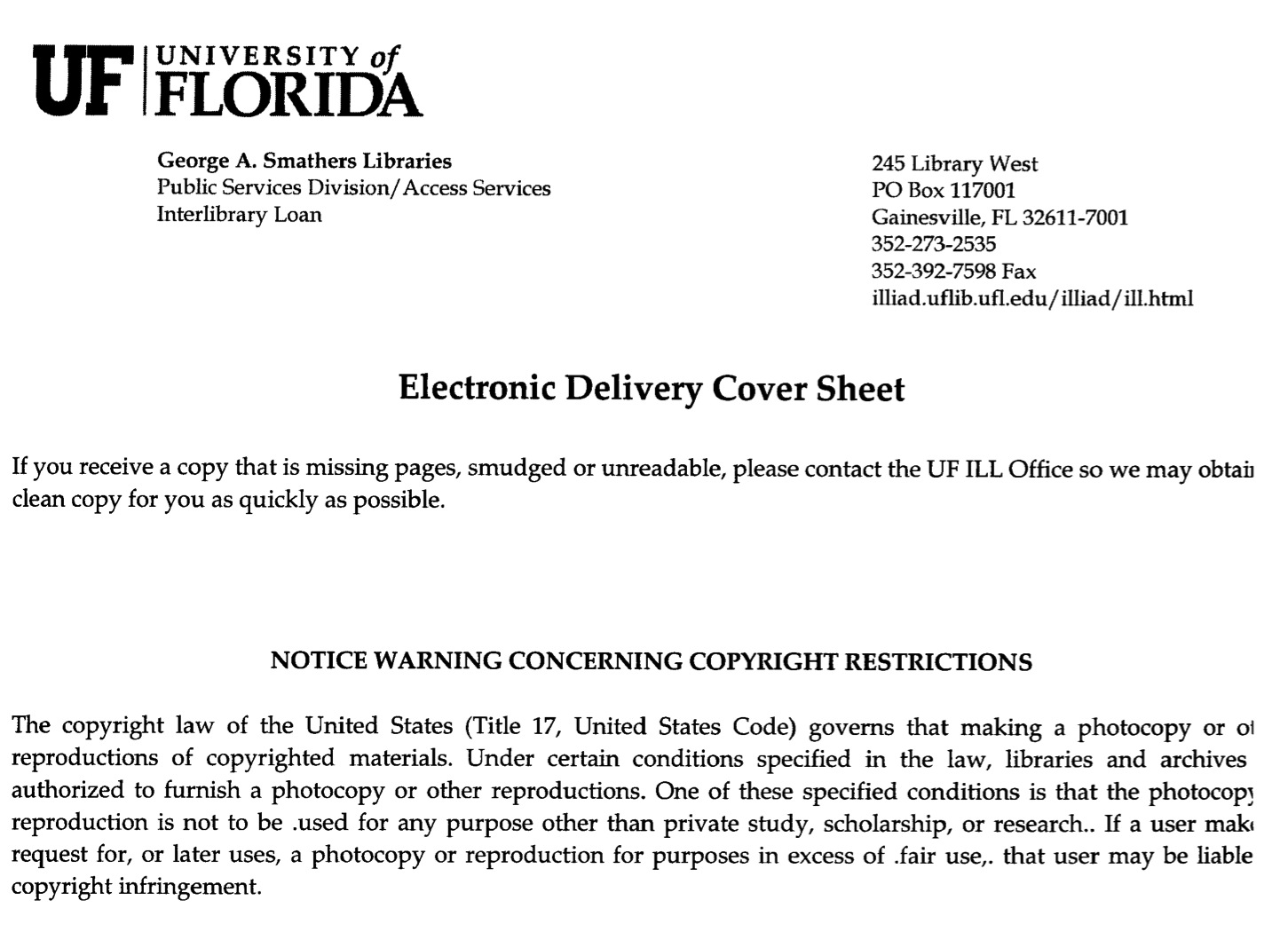

Is there a book in this class?
Please read the Class Policies page now.
Please send all work for this class to [email protected]
All beginnings are dangerous.--The poet has the choice of either raising feeling from one step to the next and thus eventually increasing it to a very high level--or else attempting a sudden onslaught and pulling the bell-rope with all his might from the beginning: both have their dangers: in the first case, that his audience may flee out of boredom, in the second, out of fear.
--Friedrich Nietzsche, Human, All Too Human II, "Mixed Opinions and and Maxims," section 163, ed. Gary Handwerk (Stanford UP, 2013), 67.
All assigned work for the course must be completed and be of passing quality to pass the course. We will learn collaboratively. I will not lecture at you while you try to stay awake. To make discussion productive, you and your fellow students must all participate in class discussion. This is a new and somewhat experimental course that I designed. It is not a course where you can do 70 percent of the work and expect to get a C in the course. To get a C in the course, you need to do 100 percent of the work, get at least a C grade on that 100 percent, and participate effectively in class discussion. Because of the large number of students in the class, I may not notice that you have not been completing the work until the end of the term. In that case, you will receive an E. And that will be very sad. :(
Requirements: TOTAL ATTENDANCE; Co-lead class discussion twice, once on a Tuesday and once on a Thursday; two discussion questions; three film shots; and three or more "BIG WORDS" for each class; student formulated quizzes each class; three 700 word papers; and a willingness to reflect, think, respond, by paying very, VERY, VERY close formal attention to texts and films.
A sad tale's best for winter: I have one / Of sprites and goblins. . . .
Yet Nature is made better by no mean
But Nature makes that mean. So, over that art
Which you say adds to Nature, is an art
That Nature makes. you see, sweet maid, we marry
A gentler scion to the wildest stock,
And make conceive a bark of baser kind
By bud of nobler race: this is an art
Which does mend Nature—change it rather, but
The art itself is nature.
—William Shakespeare, The Winter's Tale, Act IV, Scene III
Tentative Schedule: (Please expect changes to be made in the schedule from time to time during the semester--they will be announced well ahead of time both in class and by email).
January 5: Anxiety Disorders and Anger Mis/Management, or, "Die Tücke des Objekts":
Why Don't Things Work? Why Do Things Like Socks Go Missing? Why Can't You Find Your Car Keys? What Causes these Things to Happen? Is there a cause? Or is there only an occasion? Are these problems the consequence of human prostheses that turn out to fail, of technologies that do not make life better, as they seemed to promise? Or these problems hard-wired into human nature? Are they physical or metaphysical, material objects or immaterial forces? Can you tell the difference between something is necessary and something that is superfluous?
Topics to be mentioned but posibly overlooked: (German Romanticism; German Idealism; German Aesthetics; Nature and Art; Naive and Sentimental); Life as Bildungsroman; moral development; teleological; coincidence; technological progress and improvement; the rule of reason; harmony; balanced; equilibrium; therapy; the Enlightenment vs. demons, spirits, poltergeist, system, the paranormal, possession, inner fredom, accidents, glitches, delays, crashes, malfunctions, animism, venting, cursing andother speech acts, enthusiasm, superstition, the pharmakon, Magnetism, Mesmerisim, animism, disruption, distraction, interruption, clairvoyance, somnabulism, the uncanny, squeaking doors and other annoying, irritating, torturous or eerie sounds; inefficiency, waste, and unknown causes or occasions of mischief and sabotage).
The Cure? Psychoanalysis, Literature, Film, and Philosophy vs. Cognitive and Behaviorist Psychology; or SteAm vs STEM
Where would cursing go? Where would venting or ranting go? Where would silence go?
External cause versus internal projection (depth psychology; self-reflection; hermeneutics; literature; literature of the fantastic; the virtual / imagination; aesthetics)
Time Out for Trouble (1961)
 |
 |
And here is your first assignment, due tomorrow January 6 by 5 p.m.
January 7: The Problem of Feeling Angry, or Risky Readings / Moving In and Moving On:
Required Viewing:
Inside Out (2015) as Controlled Memory Demolition, Outsourcing Mourning
1. Ernst Bloch, "The First Locomotive," in Traces, pp. 124-25
2. Sigmund Freud, "Chapter VIII: Bungled Actions," in The Psychopathology of Everyday Life, p. 225.
You may read the entire chapter here, if you wish.
3. Martin Heidegger, Being and Time, Section III, Subsection 16, pages 66-71 (page numbers are on the top of the page, not on the sides)
Optional reading:
Nicholas Royle, "Chapter IX: Inexplicable," in The Uncanny, pp. 133-41.
Sigmund Freud, (1930). Civilization and its Discontents. The Standard
Edition of the Complete Psychological Works of Sigmund Freud, Volume
XXI (1927-1931): The Future of an Illusion, Civilization and its
Discontents, and Other Works, 57-146; to pp. 70-71; 77; 87-88; 91-92
Due January 11 by 5 p.m. Two discussion questions, numbered one and two and three shots with three film analysis terms on Hausu (1977), and two discussion questions, numbered one and two, and three BIG WORDS on E.T.A. Hoffman, The Sandman, with your name at the bottom of the document, due by 7 p.m. Email your DQs in one word document (as an attachment) to me at [email protected]. Don't forget to put your name in the document and in the document heading at the bottom, after your DQs, as in "yournamehere.doc." YOUR DOCUMENT SHOULD LOOK LIKE THIS.
January 12: ? is in the (Haunted) House!
Required Viewing:
Hausu (1977)
Required Reading:
E.T.A. Hoffman, The Sandman or
here The Sandman
Due January 13 by 5 p.m. 2 DQs, 3 Big Words on Sigmund Freud, "The ‘Uncanny’"
January 14: No One Home?
Required Reading:
Sigmund Freud, "The ‘Uncanny’"
FYI:
heimlich vs. unheimlich (at home vs. not at home, or "uncanny")
behaglich vs. unbehaglich (comfortable vs. uncomfortable)
Recommended Reading:
DQs etc. Are Always Due the day before class by 7 p.m. on Mondays and by 5 p.m. Wednesdays for the rest of the semester.
January 19 Sui-Citation:
Required Viewing:
White Noise (dir. Geoffrey Sax, 1997)
Required Reading:
1. Neil Hertz, "Freud and the Sandman," (pdf to the left) in The End of the Line
2. Laurence A. Rickels on Freud and "The Sandman," in The Devil Notebooks
3. Hélène Cixous, "Fiction and Its Phantoms: A Reading of Freud's "Das Unheimliche" (The "Uncanny")"
Optional Reading:
Victor Tausk and psychoanalytic suicide note (July 3, 1919 )
Freud's letter to Lou Andreas-Salome about Tausk' s end (August 1, 1919), Freud and Salome Letters, 98-99
Vicktor Tausk, "On the Origin of the 'Influencing Machine' in Schizophrenia"
Christopher Turner, "The Influencing Machine," CABINET (Summer 2004)
Sarah Kofman,"The Double is / an the Devil: The Uncanniness of The Sandman (Der Sandmann)" in Freud and Fiction, trans. Sarah Wykes, 1991, 119-62; 185-90.
Julia Kristeva, Powers of Horror: An Essay on Abjection, Columbia University Press, NY, 1980.
Martin Heidegger, Hölderlin's Hymn "The Ister"
January 21:
Required Viewing:
Being John Malkovich (dir. Spike Jones, 1999)
Required Readings:
1. Jörg Kreienbrock, Introduction to Malicious Objects, Anger Management, and the Question of Modern Literature
2. Karl Theodor Vischer, “A Rabid Philosopher" (scroll down to page 146). Or read it as a doxc here
Optional Readings:
Laurie Johnson, "The Romantic and Modern Practice of Animal
Magnetism: Friedrich Schlegei's Protocols of the
Magnetic Treatment of Countess Lesniowska" (2007)
E.T.A. Hoffmann, "Der Magnetiseur"
Friedrich Theodor Vischer, Auch Einer: Eine Reisebekanntschaft
Heimito Von Doderer, The Demons
First Paper (700 words) DUE Saturday JANUARY 23 by 11:59 p.m. Email your paper (as an attachment) to me at [email protected]. Put your name in the subject title or header of your title. Put your name in your paper. You will need a title for your paper and a thesis, an argument that you can state in one sentence. Your thesis should go at the end of your first paragraph. See Paper Guidelines. Grading: If you don't put your name on your paper, it's an automatic E. If you don't have a proper title, it's an automatic E. If you don't have a thesis, it's an automatic E. One third of your grade will be based on your title; one third on your thesis; and one third on the rest of your paper. Btw, you may figure out your title before you write your paper, but usually, you only figure out your thesis by writing your paper and what you think is your concusion needs to be moved up from the end of the essay to the front. Then you are ready to make your final revisions and add a new concluding paragraph. You may also have come up with a new title in the course of writing the paper. And then you are ready to proofread your paper. And then you will have finished writing your paper. Congratulations! :)
January 26:
Required Viewing:
The Double Life of Véronique (Kristof Kieślowski,1991)
January 28:
Required Readings:
1. Heinrich von Kleist, On the Marionette Theater (Über das Marionettentheater)
2. Paul de Man, "Aesthetic Formalization: Kleist's Über das Marionettentheater”
February 2:
Required Viewing:
The Green Room (French: La chambre verte dir. François Truffaut)
(You may watch this film on youtube.)
Required Reading:
Henry James, "The Way it Came" (1896)
revised and retitled as "The Friends of the Friends" in 1909.
You may read either the 1896 version or the 1909 version. Or you may read both.
Optional Viewing:
The Red Shoes (dir. Michael Powell and Emeric Pressburger, 1948)
Optional Reading:
Henry James, "The Altar of the Dead"
Henry James, "The Beast in the Jungle"
February 4:
Required Viewing:
Black Swan (dir. Darren Aronofsky, 2010)
Required Readings:
1. Ernst Bloch, "The Anxiety of the Engineer"
2. Walter Benjamin, "Cultural History of Toys and Toys and Play"
Optional Reading:
Heimito von Doderer, The Merowingians, or, The Total Family (excerpts)
"Das Unheimliche des technischen Zeitalters"
Optional Viewing:
Cindy Sherman, photos (Look at your own risk.)
Hans Belmer, photos (Look at your own risk.)
Barbie Killer Dolls and here. (Look at your own risk.)
Puppet sex scene in Team America World Police (Look at your own risk.)
February 9:
Required Viewing:
Kurenko (dir. Kaneto Shindô,1968)
Required Readings:
1. Ernst Bloch, "Technology and the Ghostly Apparition"
2. Sianne Ngai, "Introduction" to Ugly Feelings
February 11:
Required Viewing:
Kwaidan (dir. Masaki Kobayashi, 1965) (Watch the Criterion blu-ray [2015] with the three hour cut, if you can)
February 16:
Required Viewing:
The Devil is a Woman (dir. Josef von Sternberg, 1935)
February 18:
Required Viewing:
That Obscure Object of Desire (dir. Luis Buñuel, 1977)
Required Reading:
Jacques Derrida, "MyChances / Meschances," in in Taking Chances: Derrida, Psychoanalysis, and Literature, ed. Joseph H. Smith, Wiliam Kerrigan, and Wendy Kyle.
February 23:
Required Viewing:
Metropolis (dir. Fritz Lang, 1927)
Required Reading:
Andreas Huyssen, "The Vamp and the Machine," in After the Great Divide
February 25:
Required Reading:
Heimito von Doderer, "Eight Attacks of Rage" and "The Torture of the Little Leather Pouches," in A Person Made of Porcelain and Other Stories
Required Viewing:
The Missing Picture (dir. Rithy Panh, 2013)
March 2: Spring Break
March 4: Spring Break
Screning March 7 of A Tale of Winter (dir. Eric Rohmer, 1992)
March 8:
Required Reading:
1.William Shakespeare, The Winter's Tale
2. Jean Paul, "(Pre)School for Aesthetics"
March 10:
Required Viewing:
A Tale of Winter (dir. Eric Rohmer, 1992)
Required Reading:
Stanley Cavell, "Shakespeare and Rohmer," in Cities of Words
Required Viewing:
March 15:
Required Readings:
1A. Friedrich Schiller, On Naïve and Sentimental Poetry (1795-96) (in Friedrich Schiller: Essays)
or
1B. Friedrich Schiller: On Naïve and Sentimental Poetry (1795-96) (in German Aesthetic and Literary Criticism. Winckelmann, Lessing, Hamann, Herder, Schiller, Goethe
Chapter 5: This is the translation Paul Alpers in his essay below)
2. Paul Alpers, "Schiller's . . . Pastoral," pp. 319 up to p. 327 (you can stop at 327)
March 17:
Required Readings:
1. Sianne Ngai, "Introduction" to Our Aesthetic Categories: Zany, Cute, Interesting
2. Paul De Man, "Kant and Schiller"
Optional Reading:
Friedrich Schiller, Letters on the Aesthetic Education of Man
Stefan Andriopoulos, "Introduction" to Ghostly Apparition: German Idealism, the Gothic Novel, and Optical Media
Immanuel Kant, Dream of a Spirit Seer Elucidated by Metaphysics (1766)
Second Paper (700 words) DUE Saturday March 19 by 11:59 p.m. Email your paper (as an attachment) to me at [email protected]. Put your name in the subject title or header of your title. Put your name in your paper. You will need a title for your paper and a thesis, an argument that you can state in one sentence. Your thesis should go at the end of your first paragraph. See Paper Guidelines. Grading: If you don't put your name on your paper, it's an automatic E. If you don't have a proper title, it's an automatic E. If you don't have a thesis, it's an automatic E. One third of your grade will be based on your title; one third on your thesis; and one third on the rest of your paper. Btw, you may figure out your title before you write your paper, but usually, you only figure out your thesis by writing your paper and what you think is your concusion needs to be moved up from the end of the essay to the front. Then you are ready to make your final revisions and add a new concluding paragraph. You may also have come up with a new title in the course of writing the paper. And then you are ready to proofread your paper. And then you will have finished writing your paper. Congratulations! :)
March 22:
Required Viewing:
Man with a Movie Camera (dir. Dziga Vertov, 1929)
March 24:
Required Viewing:
Hugo (dir. Martin Scorcese, 2011)
FYI:
http://automatomania.co.uk/; http://www.melies.eu
https://de.wikipedia.org/wiki/Schachtürke
https://en.wikipedia.org/wiki/The_Turk
"Gewinnen soll immer die Puppe, die man ‚historischen Materialismus‘ nennt. Sie kann es ohne weiteres mit jedem aufnehmen, wenn sie die Theologie in ihren Dienst nimmt, die heute bekanntlich klein und hässlich ist und sich ohnehin nicht darf blicken lassen."
The story is told of an automaton constructed in such a way that it could play a winning game of chess, answering each move of an opponent with a countermove. A puppet in Turkish attire and with a hookah in its mouth sat before a chessboard placed on a large table. A system of mirrors created the illusion that this table was transparent from all sides. Actually, a little hunchback who was an expert chess player sat inside and guided the puppet’s hand by means of strings. One can imagine a philosophical counterpart to this device. The puppet called ‘historical materialism’ is to win all the time. It can easily be a match for anyone if it enlists the services of theology, which today, as we know, is wizened and has to keep out of sight.
(Gesammelte Schriften I.2, S. 693)
March 29:
Required Viewing:
Blow Up (Michelangelo Antonioni, 1966)
March 31:
Required Viewing:
Medium Cool (dir. Haskel Weskler, 1969)
April 5:
Required Viewing:
À nous la liberté (English: "Freedom for Us"; dir. René Clair, 1931)
April 7: Double Trouble: Copyright Violation? Or Sheeple?
Required Viewing:
Modern Times (dir. Charlie Chaplin, 1936)
April 12:
Required Viewing:
Onibaba (Kaneto Shindo, 1964)
April 14:
Required Viewing:
Tales of Hoffmann (dir. Michael Powell and Emeric Pressburger, 1951)
Reading Reading:
Ernest Bloch, "On the Tales of Hoffmann"
April 19:
Final Paper (50 words, not including the title or quotation) due before class, April 19 (please email it to me at [email protected]).
Not Required Viewing:

Optional Viewing:
Dante's Inferno (dir. Harry Lachman,1935)
_02.jpg)
The Scarlet Empress (dir. Josef von Sternberg, 1934)

Sullivan's Travels (dir. Preston Sturges, 1942)
Blade Runner (dir. Ridley Scott, 1982)
The Stepford Wives (Bryan Forbes, 1975)
Ex Machina (Alex Garland, 2015)
Required Reading:
Theodor Adorno, Aesthetic Theory, selections T.B.A.
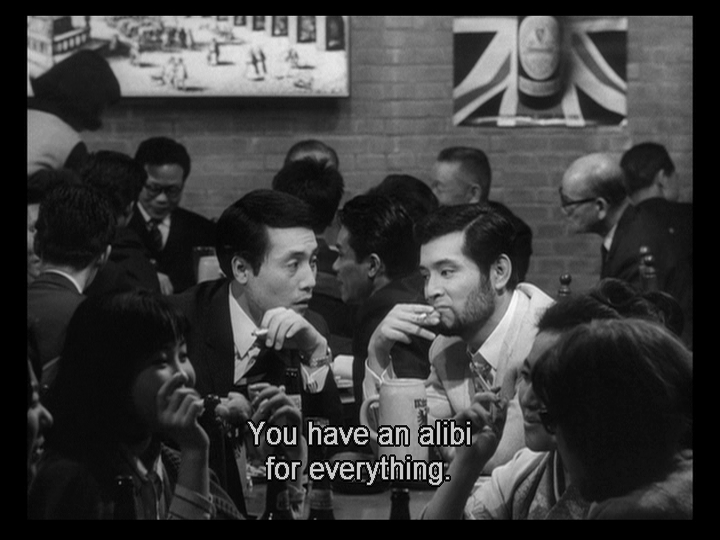
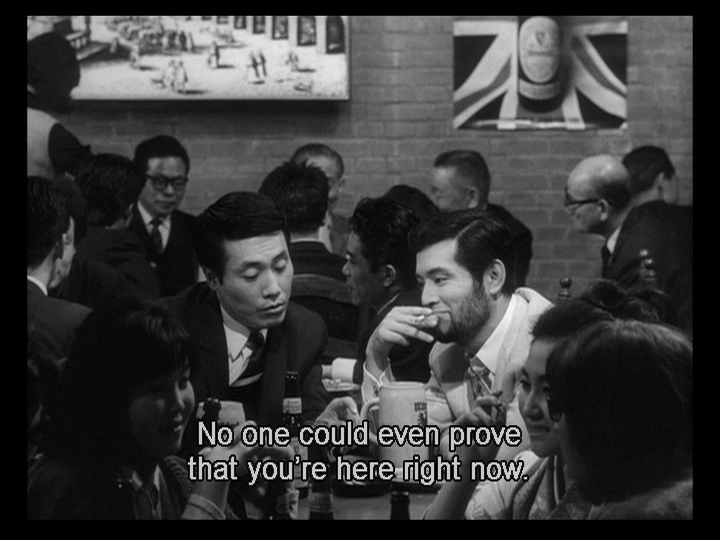
Relevant Reading:
Immanuel Kant, Observations on the Feeling of the Beautiful and Sublime and Other Writings
Schiller's Literary Prose Works
"The Art of Failure: An Essay on the Pain of Playing Video Games"
Malcolm Gladwell, "Choking Panic"
Optional Reading:
Priscila Uppal Sabotage, 2015.
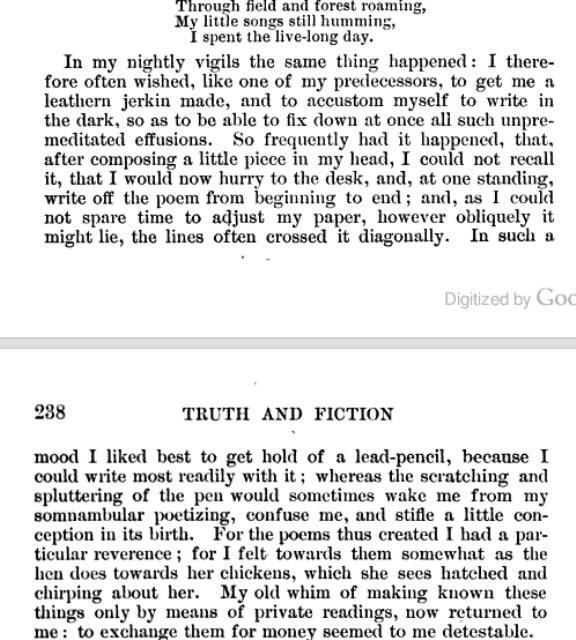
Johann Wolfgang von Goethe on writing in the dark
The Autobiography of Goethe: Truth and Fiction: Relating to My Life
Charlton Heston - Omega Man - Mannequin
Killer's Kiss 1955 - stanley kubrick - mannequin scene
Hamilton Ross, Accident: A Philosophical and Literary History 2007.
Heidegger, Martin. "The Thing" in Poetry, Language, and Thought trans, Albert Hofstader, 1971, pp. 161-84.
Heinrich Heine, "The School for Romanticism"
Arthur Schopenhauer, "Short Dialogue on the Indestructibility of Our True Being by Death"
| Heimito von Doderer. | |||
| Author: Doderer, Heimito von 1896-1966 | |||
| Published: München : Deutscher Taschenbuch Verlag, 1995. | |||
 book book |
|||
UF LIBRARY WEST General Collection |
PT2607.O3 Z53 1995 | ||
| William V. Harris. | |||
| Author: Harris, William V. (William Vernon) | |||
| Published: Cambridge, Mass. : Harvard University Press, c2001. | |||
| Summary: "The angry emotions, and the problems they presented, were an ancient preoccupation from Homer to late antiquity...see more | |||
 book book |
|||
UF LIBRARY WEST General Collection |
BF575.A5 H346 2001 | ||
Ernst Cassirer, Form Und Technik
Philosophical Writings- Arthur Schopenhauer" On the Metaphysics of Music"
Theodor Adorno, "On the Use of Foreign Words"
Tom Gunning, "Phantasmagoria and the Manufacturing of Illusion"
| Heimito von Doderer ; herausgegeben von Dietrich Weber. | |||
| Author: Doderer, Heimito von 1896-1966 | |||
| Published: München : C.H. Beck, 1996. | |||
 book book |
|||
UF LIBRARY WEST General Collection |
|||
Oh! Blessed rage for order, pale Ramon,
The maker's rage to order words of the sea,
Words of the fragrant portals, dimly-starred,
And of ourselves and of our origins,
In ghostlier demarcations, keener sounds.
Wallace Stevens, "The Idea of order at Key West"
https://dandeliondiadem.wordpress.com/2009/02/23/idea-of-order-at-key-west-by-wallace-stevens/
Sigmund Freud, "The Resistances of Psychoanlysis"; L@k@@n; The Norton Ecrits, trans Alan Sheridan
Ernest Bloch, "Supernaturalism and Stupidity"
Friedrich Kittler, Discourse Networks 1800/1900, Chapter Two, "Language Channels," 70-123; 265-290; 327-46. post-hermeneutic (unreadable, like a silent film),
E.T.A. Hoffman, The Golden Pot
Friedrich Kittler, Discourse Networks 1800/1900
Freud and Jones, correspondence on telepathy; Freud on premonitory dreams; Freud, "Mourning and Melancholia"
Bride of Chucky (dir Ronny Yu, 1998)
If you have some time to kill, you might want to compare and contrast Jonathan Culler's account of close reading with John Guillory's in "Close Reading: Prologue and Epilogue," ADE Bulletin 149 (2010), pp. 8–14. See also Geoffrey Hartman, The Fate of Reading (1975)
Wilhelm Jensen, Gradiva; Sigund Freud, Moses and Monotheism; and here; Sigmund Freud, "Jensen's Gradiva"; and Freud, "Analysis Terminable and Interminable"
Bride of Frankenstein (dir. James Whale, 1931) and The Doll (dir. Ernest Lubitsch, 1919)
The explosions of twin writing desks in Conversations of German Refugees
Conversations of German Refugees, Wilhelm Meister's Journeyman Years: Or, the Renunciants, The Fairy Tale (Goethe: The Collected Works, Vol. 10)
Johann Wolfgang von Goethe and Jane K. Brown
Friedrich Schiller, "The Spirit Seer; aka The Spirtualist," in Essays Vol. 17 Ed. Walter Hinderer
Getting Over Anger by Getting Angry / The Mechanisms of Getting Better (habits):
Immanuel Kant on Stoicism and apathy in, "Book III: On the Faculty of Desire," in Kant: Anthropology from a Pragmatic Point of View, 152,153, 154, 159, 161
EDITORS: Robert B. Louden, Manfred Kuehn
Running out of ink and cutting down the quill pen equal the inability to finish writing a love letter:
Lasse mich nebenbei, nämlich bei Gelegenheit der Rührung, die Reflexion machen, daß es im ganzen erbärmlich ist, auf wie vielen Subsubsubdivisionen von gemeinen Mitteln man endlich zum Edeln gelangt, z. B. ich in der Kirche zum Gefühl der Rührung: wie ich mich anziehen mußte, Stiefel, Weste und alles, Treppen hinab- und hinaufzusteigen, in den Kirchenempor zu treten, hinauszusehen und vieles Körperliche anzuhören hatte, bis ich endlich das Geistige in die Seele bekam, was man eine Rührung nennt. Ja wieder dieser rein geistige Gedanke selber, auf wie vielen körperlichen Umwegen erst kann er bei dir, meine Gute, ankommen! Muß ich nicht leider eintunken, Sand streuen, siegeln, auf die Post schicken (Zwischen-Kleinigkeiten lass' ich zu Hunderten weg) und du deinerseits wieder Porto zahlen, Siegel aufbrechen, am Papier hinablesen bis zum gedachten Punkte? –
Jean Paul Richter, Der Komet Kapitel 72
Posthumous Works
Der letzte Brief eines Literaten / The Last Letter of a Literary Man (1932)
http://www.arthur-schnitzler.org/corpus/
Andreas Thameyers letzter Brief (Andreas Thameyer's Last Letter,
1902). Before committing suicide, Andreas Thameyer writes a letter to
explain his deed. He has lost his social status as his wife has given
birth to a negroid baby, leading to rumors that she has been
unfaithful to him. In the letter, Thameyer tries to prove that there
are more instances in history of strange births after pregnant women
received a shock on seeing a fierce animal... (Translated in Viennese
Idylls at Archive)
https://archive.org/details/cu31924026341788
Beau Geste "Please Publish" posthumously
Friedrich Theodor Vischer, Über das Erhabene und Komische: ein Beitrag zu der Philosophie des Schönen 1837
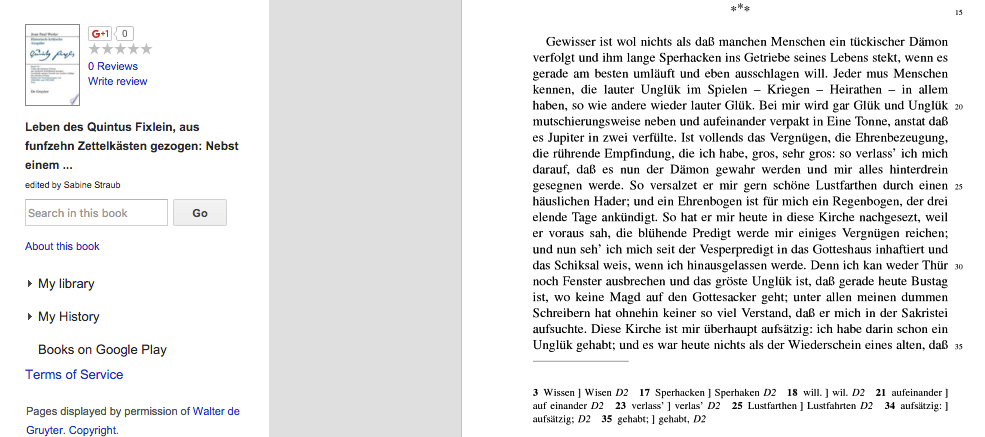
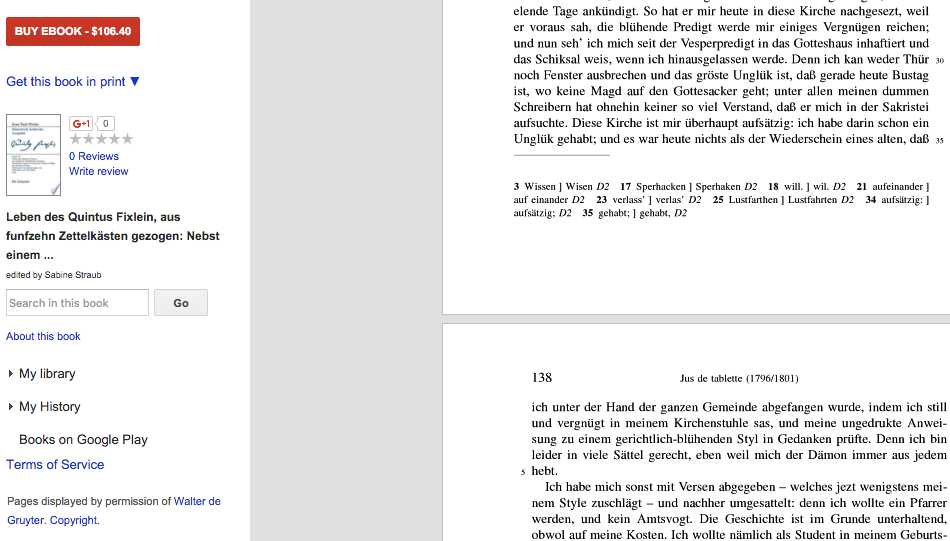
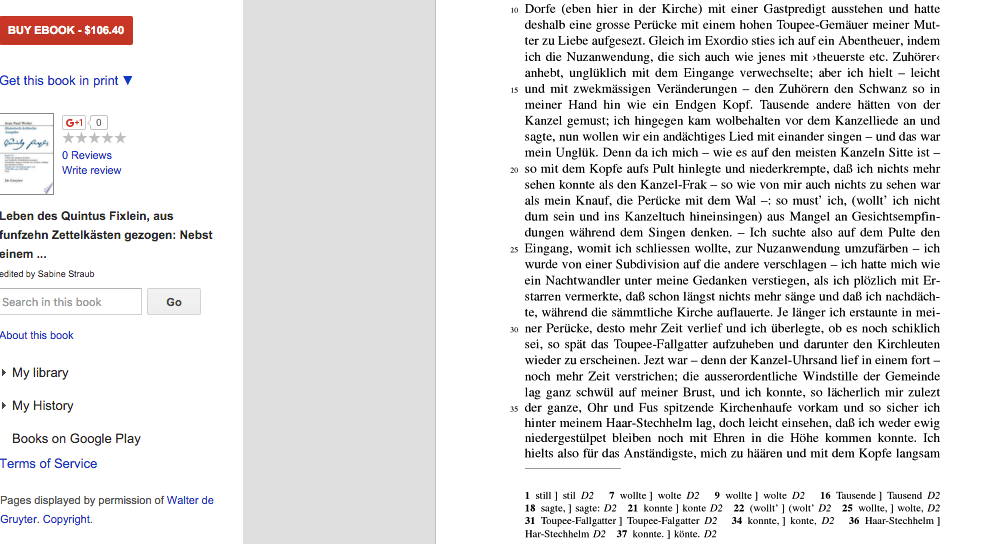
J. A. Bergk, Die kunst, bücher zu lesen. 1799
Uwe Wut, "Mikrologies der Wut" Text und Kritik. Jahrbuch. 150 (2001) 37-47
UF LIBRARY WEST General Collection
PN4 .T4 or PN4 .T45
David Hume. AN ENQUIRY CONCERNING HUMAN UNDERSTANDING.
Shaftesbury, Letter on Enthusiasm
Edmund Husserl, Ding und Raum Vorlesungen ed. Karl-Heinz 1907
Bergk, Die kunst, buecher zu lesen, 7-8
Jean-Paul, Des Amts-Vogts Josuah Freudel Klaglibell gegen seinen verfluchten Dämon
Life of Felix Quinlein, in The Works of Thomas Carlyle: German romance; translations from the German.
Thomas carlyle, ed. (Camden House 1991) See pp. 113-19; 185; 294-96 (181-82)
Jean Paul Richter, Werke, ed. Norbert Miller vol. 4: 7-259
Lesesucht und Lesewut (Reading Addiction and Reading Rage)
Jean Paul.Werke [Hrsg. von Norbert Miller. Nachwort von Walter Höllerer]
München, C. Hanser [1959-63; v. 1, 1960]
UF LIBRARY WEST General Collection
PT2454 .A1 1959
Jean Paul, The Invisible Lodge (1883) trans. Charles T. Brooks
Jean Paul Richter, Life of Merry Masterkin Maria Wutz in Auenthal: A Kind of Idyll, 113; Appendix to The Invisible Lodge but not translated by Charles T. Brook.
It has been translated by Timothy and Erica Casey, Jean Paul: A Reader (1991), 83-114
Jean Paul, Siebenmal, Norbert Miller, Werke 2: 7-565; to p. 283 Munich: Hanser 1976
Full text of "Jean Paul. Sämtliche Werke II/2"
Einsteiger - Jean Paul Wanderweg
Page numbers from
(English) on left versus Siebenkas (German) on right
36/ 57
169 / 179
36 / 57
223 / 231
223-24 / 231
Appendices to Life of Felix Quinlein have not been translated 47
Jean Paul Richter: Schulmeisterlein Wutz - Kapitel 1
Wutz, 1, 455 dying with toys
Jean Paul Richter, Horn of Oberon: Jean Paul Richter's School for Aesthetics. Trans. Margaret R. Hale. Detroit: 1973, p. 36 / 57
Jean Paul, Der Komet 1311 (ed. Norbert Miller) Suepitz "angewöhnten, 13112:441
1017-1018
Jean Paul Richter, Der Komet - Kapitel 1
Ludwig Binswanger, "Extravagant" in Being-in-the-World, 342-41
Jean Paul Richter, Titan: A Romance
Karlheinz Stierle, " Das Komische der Handlung, Komik der Sprachnadlung, Komik der Comédie,"
in Das Komishce, Poetik, und Hermeneutik, ed. Wolfgang Presiendanz 1976, 240
Thomas Bernhard, Extinction
Thomas Bernhard, Correction
Thomas Berhard, The Loser
Thomas Bernhard, Wittgenstein's Nephew
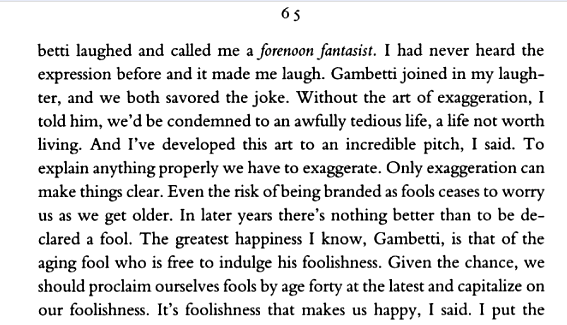
Item no. 8A Packing It Up: The Un/Open Desk
The last of A's papers is a narrative entitled "The Seducer's Diary." Here we meet with new difficulties, inasmuch as A does not declare himself the author but only the editor. This is an old literary device to which I would not have much to object if it did not further complicate my own position, since one author becomes enclosed within the other like the boxes in a Chinese puzzle.
—Victor Eremita, Preface to Either/Or, 8-9.
The archive today consists of Kierkegaard's literary remains, originally numbered by Henrik Lund; subsequently disfigured by a series of lacunae and a great many deletions, corrections, and additions . . . ; but packaged in a systematic order for which P.A. Heiberg is responsible. Nonetheless, the archive still contains traces of Kierkegaard's own packaging, and it is clear that he took great pains to present himself to posterity in an orderly fashion. —Written Images, 109.
The editors . . . placed the mass of booklets, books sheets, pages, strips of paper, and so on into semitransparent glassine envelopes. The envelopes were then placed in files, and the files were placed in . . . fiberboard boxes. —Written Images, 108.
Barfod took the liberty of cutting up most of the
http://www.rhizomes.net/issue20/burt/index.html Page 34 of 67
Rhizomes 20: Richard Burt 7/15/10 8:41 AM
volumes... Barfod's interference was not limited to cutting and pasting. While he sat there with the papers he made diligent use of his pen—on the papers.
—Written Images, 83; 97-98.
The Point of View on My Work as an Author
must not be published, no, no! . . . The book itself is true and in my opinion masterly. But a book like that can only be published after my death. . . . But I must be careful about the idea of dying, lest I go and do something with the idea of dying in half a year and then live to be eighty-two. No, one finishes a book like that, puts it away in a drawer, sealed and marked: To be opened after my death.
—Søren Kierkegaard, "N.B. N.B. N.B." in The Point of View on My Work as an Author (published posthumously under Kierkegaard's name by Peter C. Kierkegaard in 1859), 174; 176.
We may advance our understanding of the genre of posthumography by returning to Kierkegaard's writing desk in Either/Or. [xlix] Kierkegaard stages the publication of his work (he waited five yeas to publish it [l]) as a problem of publishing an unknown, living or dead author's works in ways that anticipate, on the one hand, the very problems editors of Kierkegaard's own works have faced after his death, and, on the other, how to read Kierkegaard's works in relation to his authorship and editing, pseudonymous and not, as well as to the extreme care he took in deciding when to publish certain works so as to ensure he would not be misunderstood by his readers. [li] After stating the thesis, that the outer is not the inner, that the outer conceals a secret, which was hidden, the pseudonymous editor of Either/Or, Victor Eremita, begins the preface by telling a story about a writing desk in order to explain the "most curious manner" which put him "in possession of the papers I have the honor of presenting to the reading public" (4):
For the sake of order, it is probably best to tell first how I happened to come into possession of these papers. It is now about seven years since I spotted in a secondhand shop here in the city a writing desk that immediately attracted my attention. It was not a modern piece of work, had been used considerably, and yet it captivated me.
Eremita feels compelled to justify the purchase of the desk since its acquisition leads to his discovery of anonymously authored papers:
It is impossible for me to explain the basis of this impression, but most people presumably have had a similar experience during their lives. . . . My heart pounded when I went into the shop. I bought it and paid for it. This is the last time you are going to be so prodigal, I thought. In fact, it is really lucky that you did buy it, for every time you look at it you will be reminded of how prodigal you were; with this desk commences a new period in your life. Ah, desire is very eloquent, and good intentions are always on hand.
The desk has nothing to do with writing, however. Eremita moves the desk into his home where he can keep doing what he did with it before he bought it, namely, not using it:
The writing desk was set up in my apartment, and just as in the first phase of my infatuation I had my pleasure in gazing at it from the street, so now I walked by it here at home. Gradually I learned how to know its numerous features, its many drawers and compartments, and in every respect I was happy with my desk. (4; 5)
The only thing Eremita stores in his desk is money, and he accidentally finds the papers only when a drawer with the money in it is stuck and he needs to open it to get some money because he is in a rush:
page35image34776 page35image34936 page35image35096
I opened the desk to pull out the money drawer and take what happened to be at hand. But the drawer
http://www.rhizomes.net/issue20/burt/index.html Page 35 of 67
Rhizomes 20: Richard Burt 7/15/10 8:41 AM
would not budge. Every expedient was futile. It was a most calamitous situation. To run into such difficulties at the very moment when the coachman's enticing tones were still ringing in my ears! . . . I was furious. . . . A hatchet was fetched. I gave the desk a terrible blow with it. Whether in my rage I aimed wrong or the drawer was just as stubborn as I, the result was not what was intended. The drawer was shut. And the drawer stayed shut. (5)
Rather than telling an open and shut story, Eremita tells a shut and open story leading to the discovery of an author's papers:
But something else happened. . . . A secret door that I had never noticed before sprung open. This door closed off a compartment that I obviously had not discovered. Here, to my great amazement, I found a mass of papers, the papers that constitute the contents of the present publication. . . . (6)
Because he has no time to read them then and there, Eremita repackages them in a pistol box after he empties out the pistols:
In the greatest haste, a mahogany box that usually contained a pair of pistols was emptied and the papers deposited in it. . . . My servant accompanied me with the mahogany box. (6) [lii]
After boxing up the papers, Eremita explains how he has edited them. He discovers that they fall into two sets of papers: there are two kinds of handwriting, two kinds of paper, and they have different contents, one on the aesthetic and the other on the ethical. Despite his extraordinarily diligent efforts, Eremita is unable to obtain any information about the identity of either author, so he refers to one author as "A" and the other as "B." And since there are no titles, Eremita supplies them, and divides Either/Or up into two parts and two volumes, one for A's papers and the other for B's papers. Organizing B's papers is easy because they are made up letters that follow a sequence. A's papers are a different story:
I have let chance fix the order—that is, I have let them remain in the order in which I found them, without, of course, being able to decide whether this order had chronological value or ideal significance. The scraps of paper lay loose in the compartment, and I therefore had to assign them a place. (7-8)
A's papers are difficult to edit as well because A begins the last section, entitled The Seducer's Diary, by explaining that he has made "an accurate clean copy" of a "hurried transcript" he made of a bound volume he found in the unlocked desk of a friend: "One drawer stood open. In it was a mass of loose papers, and on top of them lay a large quarto volume, exquisitely bound" (303), that is the seducer's diary. "A" includes with the diary a "collection of letters" without dates from the woman who is the object of the seducer's attentions, but the letters are undated and possibly incomplete. "A" has "copied them and interleaved them in my fair copy" (310).
The "literary device" of the found papers employed by A and also by Kierkegaard through Eremita does not deliver what it promises, namely, some secret that might reveal the inner and shows how it is not the outer. The device, both literary and philosophical, unfolds through a turbulent dynamic that makes secrecy irreducible to inwardness and reading itself into a series of multiple (non)choices. Eremita ends the preface with a word to the reader in which he channels A and B and, becoming a ghostwriter or a dictation machine, reciting what they would say.
A presumably would have no objection to the publication of the papers, and he probably would shout to the reader, "Read them or do not read, you will regret it either way." What B would say is more difficult to determine. He perhaps would reproach me for something or other, especially with regard to the publication of A's papers, and he would make me feel that he had no part in it, that he would wash his hands. Having done that, he perhaps would address the book with these words: "Go out into the world, then; avoid, if possible, the attention of the critics; visit an individual reader in a favorably disposed hour, and if you should encounter a reader of the fair sex, then I would say: My charming reader, in this book you will find something that you perhaps should not know, something else from which you will presumably benefit by coming to know it. Read, then, something in such a way that, having read it you may be as one who has not read it; read the something else in such a way that, having read it, you may be as one who has not forgotten what has been read."
Both A and B deconstruct the distinction between reading and not reading: for A, the choice between reading and not reading Either/Or is a non-choice since the outcome will be to regret either; B opposes male and female readers, but then turns the reading of the charming reader into non-reading: "be as one who has not read it." Eremita then reiterates
page36image43320
http://www.rhizomes.net/issue20/burt/index.html Page 36 of 67
Rhizomes 20: Richard Burt 7/15/10 8:41 AM
B's advice: "As editor, I shall add only the wish that the book may meet the reader in a favorably disposed hour and that the charming reader may scrupulously succeed in following B's well-intentioned advice" (14-15).
Part Two of Either/Or ends with a similar address to the reader on the topic of reading:
It is not, however, to tell you this that I am writing, but to send you a sermon by him that was enclosed in the letter. Not wanting to instigate your criticism, I did not wish to show it to you personally, but send it to you by letter so that it may make its impression on you in quietness. . . . Take it, then; read it. I have nothing to add except that I have read and thought about myself, read it and thought of you. (338)
In this case, the pseudonymous author turned reader presents a text that matches The Seducer's Diary in its placement in relation to a double reading. But the difference between the two readings, assuming there is one, by the author's own account adds nothing.
At one point in his seventh seminar, The Ethics of Psychoanalysis, Jacques Lacan returns to Heidegger's example of the jug, which he misreads,
https://books.google.com/books?id=LM7vCAXMnbYC&pg=PA31&lpg=PA31&dq=jacques+lacan+the+thing+heidegger&source=bl&ots=QjnRyRCJtq&sig=VCT8QDoFZ2JHEwjLCPxVMugARMU&hl=en&sa=X&ved=0ahUKEwjFxJGDvIvKAhUM5mMKHRx0BkEQ6AEILDAC#v=onepage&q=jacques%20lacan%20the%20thing%20heidegger&f=false
87th Precinct -The Floater ( Pilot Episode)
https://www.youtube.com/watch?v=AI5Vn0uUkGY
deaf mute wife gena rowlands
Jacques Derrida, "Restitutions of the Truth in Pointing [pointure]" in The Truth in Painting,
Martin Heidegger, "The Origin of the Work of Art"
Meyer Shapiro, "The Still Life as Personal Object--A Note on Heidegger and van Gogh," in Theory and Philosophy of Art: Style, Artist, and Society
Meyer Shapiro, "Further Notes on Heidegger and van Gogh," in Theory and Philosophy of Art: Style, Artist, and Society
http://users.clas.ufl.edu/burt/filmphilology/sched.html
